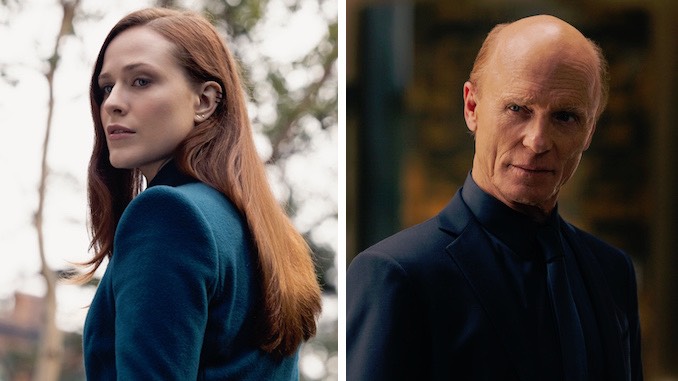By Returning to Its Beginnings, Westworld Season 4 Finally Gets to Its Violent Ends
After a third season that was all over the place, the show returns to two core characters.
Photo Courtesy of HBO
There are 387.44 million miles of printed circuits in wafer thin layers that fill my complex. If the word hate was engraved on each nanoangstrom of those hundreds of millions of miles it would not equal one one-billionth of the hate I feel for humans at this micro-instant. —I Have No Mouth and I Must Scream, by Harlan Ellison
When it originally debuted in 2016, Westworld defied expectations in any number of ways, starting with how it teased a much deeper premise out of an old sci-fi movie (and the largely forgotten 1980 spinoff). Michael Crichton’s original feature, about a park that runs on weird science and hubris succumbing to the inherent danger of its attractions (no, not that one), provides some of the set dressing of the HBO show, but it’s a completely different beast with a completely different agenda. Coming off a two-year hiatus (the longest two years of our lives and counting), the show’s fourth season manages another feat, all the more impressive since its third season went into completely unexplored territory. The fourth season’s early episodes have finally delivered on the promise of the very last shot in the show’s very first episode.
Westworld’s pilot should probably rank among the best of the last decade, just for how much worldbuilding it manages in the course of laying out its premise. There are a lot of ground rules in Westworld, the park within the show: What the android “hosts” can and cannot do, what supposed limitations on them their flawed creators have imposed and how those limitations manifest (an anachronism “Doesn’t look like anything” to them), what the human guests of the park are allowed to get away with (whatever their twisted hearts may desire).
The exposition surrounding all that comes across with a brevity that respects Westworld’s viewers while still keeping the plot moving along fleetly. There are a lot of characters in Westworld, and even the bit players have goals that are understandable if not always compelling (full-of-himself lead writer Simon, portrayed by Lee Sizemore, eventually takes a deeper turn in later seasons, but even his petty motivations in Season 1 will ring true to the unappreciated artist in all of us). There are a lot of themes and ideas in Westworld: Questions of free will, of morality, of what effect violence has not just on the victim (on the survivor), but on the perpetrator.
Core to all of those questions is the show’s central power dynamic: Human vs. machine, guest vs. host, master vs. slave. And so the show’s two most important characters, right from the first episode, have always been Dolores and William, the maiden and the Man in Black. Their relationship is the foundation of the rug-pull at the end of the first episode and the one at the end of the season. We discover that the A and B plots happening inside the fictional expanse of the park actually follow the Man in Black at two different parts of his life: Before and after his disillusionment with virtuousness and his embrace of total ruthlessness.
William (Ed Harris in the show’s “present”) is a callback to the 1973 film in a few ways: Dressed all in black, a deadly gunfighter, a plodding and inexorable threat. Yul Brynner’s robotic gunman was the scariest thing in the movie, and Harris’ Man in Black is the scariest thing in the show: A normal human being whose only superpowers are seemingly money and cruelty, both in infinite supply. The show pulls the trick of making you assume that Teddy (James Marsden, an actor born to play the Default Hero) is the wide-eyed and virtuous guest of the park who exemplifies the white hat mentality. You think, for just a single episode, that we’re going to see someone play the game as a paragon.
Teddy’s just another host, though, and the park, as the world outside it, is ruled by guys like William, the equivalent of a videogame player who has become bored with the microtransactions and cheat codes his wealth have granted him, and so has set his heart toward breaking the game. It would be the most chilling reveal of the first episode if not for the very last shot, in which William’s android victim musters the agency to casually swat a fly with the precision and callousness of the machine she really is.
-

-

-

-

-

-

-

-

-

-

-

-

-

-

-

-

-

-

-

-

-

-

-

-

-

-

-

-

-

-

-

-

-

-

-

-

-

-

-

-








































